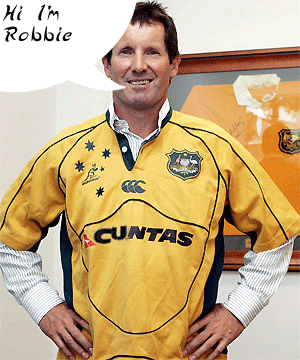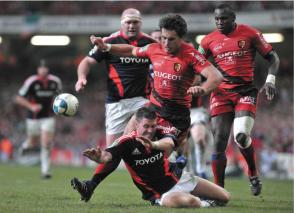Not the most beautiful and free-flowing of games, but these big finals rarely are. There’s not much arguing with the excitement it generated, though, another intensely fought contest between two of Europe’s best sides. I fancied Munster beforehand, but by half time I was beginning to think Toulouse would swing it.
They needed to score early in the second half, which they did, a classic French try. It makes you wonder why they don’t always play that way. French sides in general seem to have tempered their instinct for running rugby with something more practical, but it’s when they cut loose, as Cedric Heymans did for their try in the second half, that you think they might be impossible to live with.
We at Leicester went down to Toulouse earlier on in the competition for one of our pool games, and they played a similar sort of way, taking us on up front. They did a good job, as it turned out, and we lost. It’s a harsh place to go when the crowd are up and they get those bands playing.
But their fans aren’t great at travelling, and maybe that’s why the French teams have a reputation for the same. The crowd in the Millennium Stadium were overwhelmingly Irish. But the myth of the French travelling badly has been exploded lately, not least by Toulouse, who have won this title three times, and each one has been on foreign soil.
They could have won here again – it was close enough to have been a bit of a lottery – but Munster’s management of the game was superior come the end.
Both sides may have been helped by the pools they were in. A bit like the World Cup, the finalists had each emerged from a testing pool. Australia were a good example there – they hadn’t had a proper contest and the way Canada challenged them physically in their last pool game was what tipped us off that there may be a weakness if we went for them.
Similarly, if you’re in one of the Heineken Cup’s weaker pools, it can lead to the development of bad habits as you cruise past teams in a way that is unrealistic come crunch time. It was obvious from yesterday’s game that this did not apply to either side.
I don’t know if it is anything to do with the World Cup, but you could argue that this year’s Heineken Cup has been a bit cagier than previous events, which doesn’t have to be a bad thing. No one really wants to see teams canter off into the distance without earning their right to victory. You want to see contests, and you want to see imperfections and mistakes as people deal with the pressure.
Casual fans may not have seen too much to recommend yesterday, but, as anyone who has watched and played the game for a long time would, I found it absorbing. It’s a sensitive matter these days with the Experimental Law Variations due to come in next season, introduced to make the game more marketable. The game is struggling for exposure in Australia, for example, where rugby union comes third or fourth in the nation’s sporting interests.
But yesterday we saw a game that threw up a lot of the things that make our game different from Aussie rules or rugby league – the intricacies of the set piece and at the breakdown, the ruck and the maul. These could go south if the laws change.
There are a lot of conspiracy theories about it being a directive dreamt up by the Australians, and I have no idea if that is true. But, up here, the game has never been in better shape, not only in terms of the entertainment but in terms of the numbers watching it. So the obvious thing to ask is, why change it?
But it’s happening, and it is a challenge for us up here to make something of it. There will be a lot of confusion as players and referees get used to it, but, who knows, if it all pans out as it says on the tin, it could end up making things more exciting. Then again, we don’t have the mild winters they have in Australia, and short of playing with a beach ball no law changes are going to do anything about having to take on the English winter. But if Leicester can be holding the Heineken Cup this time next year after a 58-43 win in the final I won’t care what laws we were playing under.
Leicester hooker George Chuter has played 21 times for England
And there is nothing wrong with this type of game either, it seams the rugby world is split and for good reason. Please read Foundation posts found under pages, thanks.




